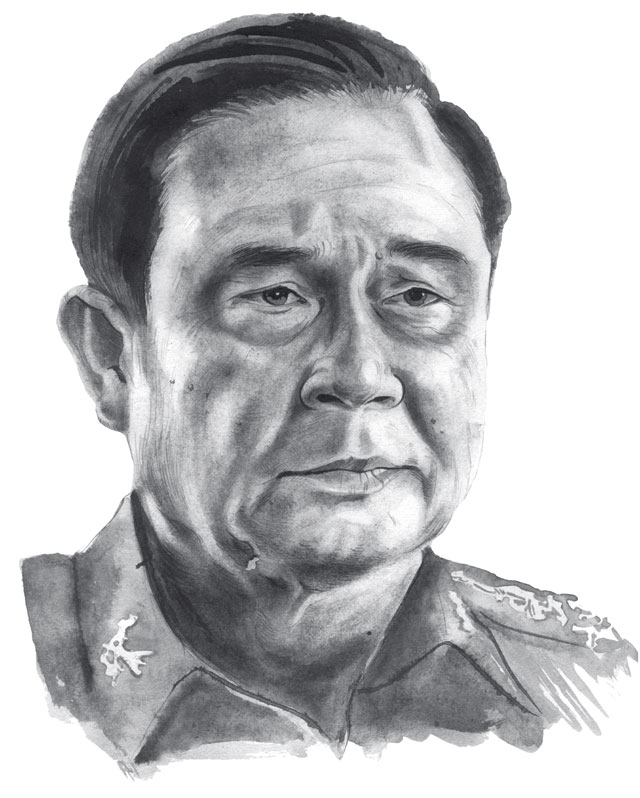The words ‘coup’ and ‘new military leader’ have become synonymous with Thailand. Does General Prayuth Chan-ocha, the Kingdom’s unelected leader and head of the army, have what it takes to bring the country out of its latest dark place?
On May 22, the commander-in-chief of the Royal Thai Army, General Prayuth Chan-ocha, announced that he was taking over duties as prime minister of Thailand as the leader of the National Council for Peace and Order (NCPO). On May 26, King Bhumibol Adulyadej gave his all-important seal of approval to the coup and so began a new chapter in Thailand’s history – led by yet another military chief.

There is no doubt that the army – seen by many Thais as the protector of the nation – and in particular Prayuth, has the strength to stay in power, at least for now. “The fact that he comes from one of the most powerful military segments in the army, the Queen’s Guard, proves his strength,” said Dr Pavin Chachavalpongpun, associate professor at Kyoto University’s Centre for Southeast Asian Studies. “The Queen’s Guard currently forms the inner circle of the coup-makers, dominating Thai politics with a royal endorsement. Prayuth’s connection with the palace, his representation of the monarchy network and his ruthless approaches are his strengths.”
In addition to these royal ties, Dr Charnvit Kasetsiri, a retired Thai historian, points out that Prayuth enjoys great support from Thailand’s influential middle class. Together this is a potent mixture, though Charnvit remains
a little mystified by the coup’s timing. “I am not sure if Prayuth has taken his own initiative in taking power,” Charnvit said. “He seemed to be working well with [former prime minister] Ms Yingluck before May 22.”
Theories abound over the timing and motives of the coup, with some seeing the hidden hand of the monarchy’s supporters pulling the strings. For Giles Ji Ungpakorn, a former associate professor at Chulalongkorn University’s faculty of political science in Bangkok who fled to the UK when faced with lèse-majesté charges, the coup is little more than one man following his own perceived destiny.
“Prayuth is an arrogant idiot who dreams that he is a 1960s-style military dictator,” said Ungpakorn. “There is no subtlety in his actions and most intelligent people laugh at him behind his back. He is mainly acting along his own ideas and is certainly not controlled by the monarchy.”
Pavin disagrees. “For a grand scheme such as a coup, he must have received instruction from those in higher places,” he said. “For day-to-day work, though, he may have the ultimate decision-making power – as we see from so many absurd policies that can only have been initiated by Prayuth alone.”
In a televised speech on May 30, the requisitely stern-looking Prayuth said the NCPO had taken over to “stop the violence and break the deadlock” and “return happiness to the Thai people… and to place the monarchy above all conflicts”. However, the real reasons for staging the coup are clear, according to Pavin. “Taking control of politics to ensure that the elites will be in charge of the upcoming succession” is the NCPO’s motive, he said. “Elections have never been on [Prayuth’s] agenda. Those who dream that the military will organise an election soon will be disappointed.”
While Prayuth certainly has the will, as well as the might, to become Thailand’s next leader, the Kingdom’s relatively well-developed economy and sometimes delicate geopolitical situation requires much more than clout in all the right places.
“His lack of diplomatic skill, linguistic proficiency and basic knowledge of international politics will make his leadership a failure,” said Pavin. “Look at the way he responded to sanctions from the EU. Instead of reassuring the EU of a quick return to democratic rule, he talked about the sense of pride in the Thai nation. Wrong issue, wrong timing and irrelevant.”
One thing Prayuth cannot control is the march of time. He is fast approaching the age of retirement and, if he chooses to continue, he may encounter opposition from his military peers. “He is 60 years old and will have to retire from the army post by the end of September,” said Charnvit. “He may extend his date of retirement, but this could create tension.”
Prayuth is in no rush though, according to Pavin. “The game here is for him to stay,” he said. “The royal succession is imminent. The stakes are high.”
Keep reading:
“Digging for gold, striking resistance” – Contamination from a gold mine has affected the health and livelihoods of a rural community in northeastern Thailand. Now the villagers are fighting back

